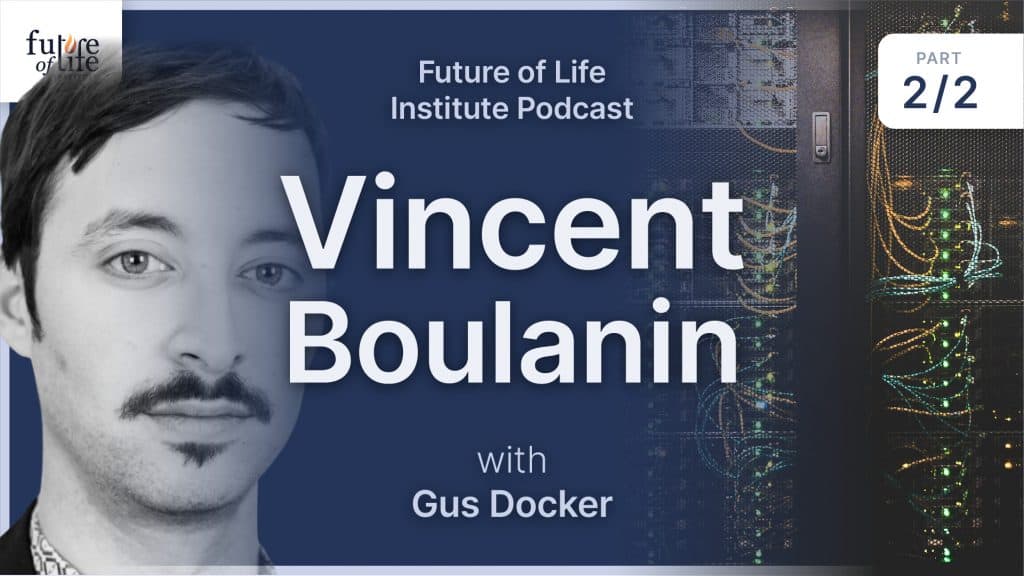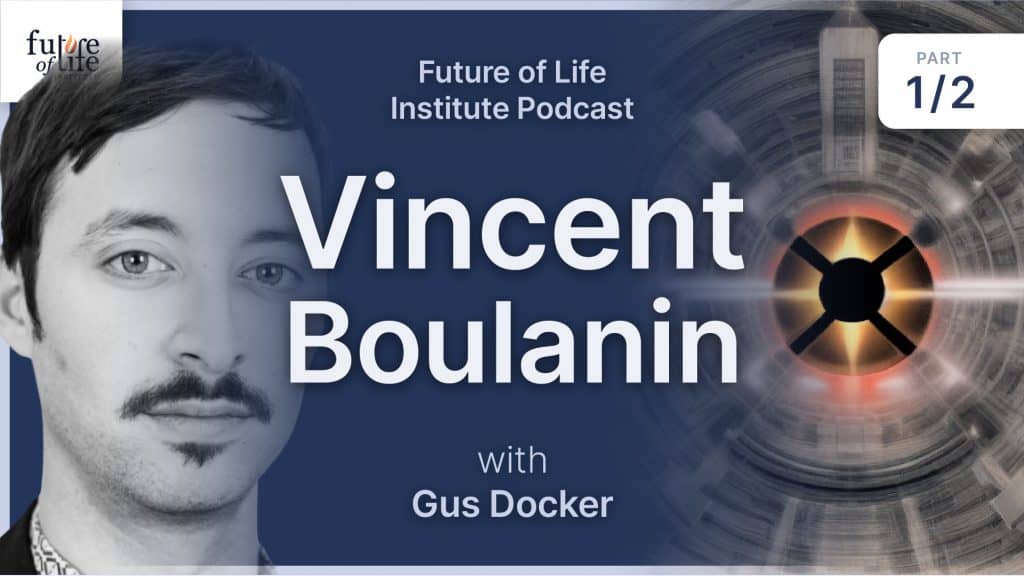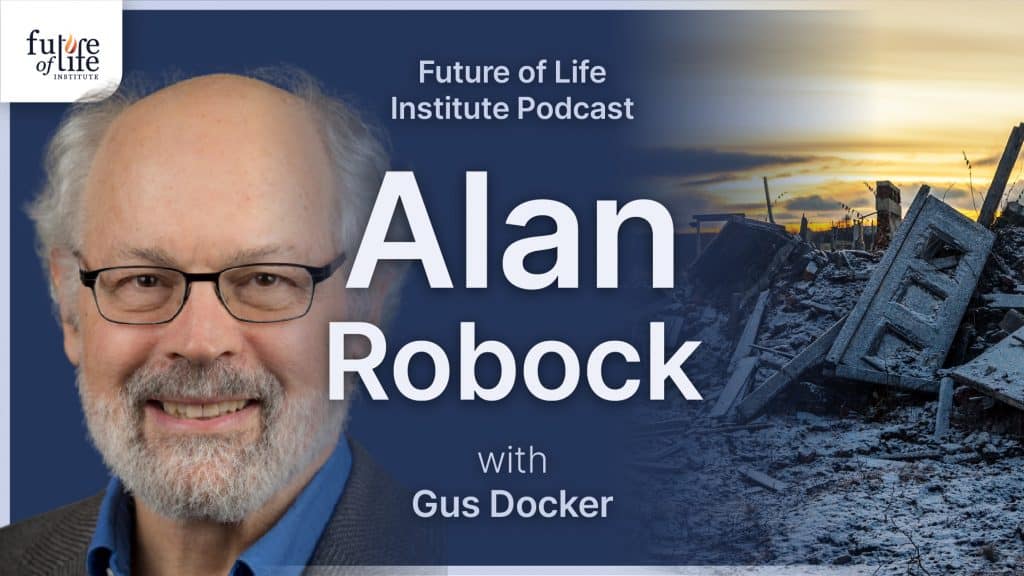A City’s Guide to Nuclear Weapons Divestment
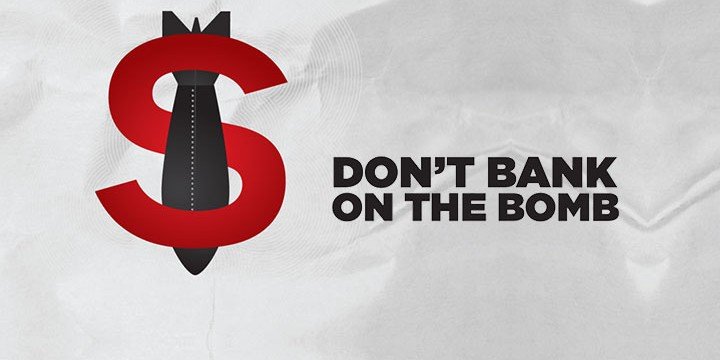
Contents
A City’s Guide to Nuclear Weapons Divestment
Invest in a Positive Future
Introduction: Nuclear Weapons Today
There are nearly 15,000 nuclear weapons on Earth.
Only nine countries in the world have nuclear weapons, yet all are modernizing their nuclear forces and some are increasing their rhetoric around possible use of nuclear weapons. A Pentagon report argued that just a few hundred nuclear weapons provide iron-clad deterrence, yet the superpowers have about 7,000 each. To make things worse, enough weapons to end civilization as we know it are kept on hairtrigger alert, allowing launch within a few minutes. Once airborne, they cannot be recalled even if their launch turns out to be unauthorized or due to a false alarm – which has almost happened on many occasions. The nine nuclear-armed countries (Russia, the United States, France, the United Kingdom, China, India, Pakistan, Israel and North Korea) spend an estimated $100 billion on their nuclear forces every year, assembling new warheads, upgrading old ones, and building missiles, launchers, and the supporting technology to use them.
Investments are not neutral.
At least 27 private companies are involved in nuclear weapons production – making up about 2% of the S&P 500.1 Financing and investing in these companies are active choices, based on a clear assessment of an institution and its plans. Any financial support delivered by an investor to a company demonstrates tacit approval of what that company does, including producing nuclear weapons. In choosing how to
invest, investors can have a significant impact on a company’s strategic decisions. Choosing to exclude financial institutions that invest in nuclear weapons producing companies from your portfolios sends a clear message that you view such activities as unacceptable.
Public exclusions by investors, including governments and financial institutions, have a stigmatizing effect on companies associated with illegitimate activities. There are numerous examples, from child labor to tobacco, climate change, and South African apartheid, for which divestment had a profound impact. Divestment generates stigma by drawing attention to inhumane practices and mobilizing the public
against the offending companies, pressuring them to change their behavior. And while it is unlikely that divestment by a single financial institution or government would sufficiently pressure a company to end its involvement in the production of nuclear weapons, divestment by even a few institutions or States can.
Nuclear weapons are illegal.
The Treaty on the Prohibition of Nuclear Weapons was adopted in the United Nations in July 2017. This new treaty comprehensively prohibits the making, having and using of nuclear weapons. It will significantly change the context of the nuclear weapon debate, and add to the stigma surrounding nuclear weapons. In addition, Article 1 of the treaty prohibits states parties from assisting with other acts prohibited under the treaty. Financing is a form of assistance contributing to the production of nuclear weapons. Many banks, pension funds, and insurance companies don’t want to be associated with illegal weapons. U.S. cities opposing a new nuclear arms race should also use this new treaty as a good reason to examine their financial relationships with companies that are associated with nuclear weapons and by putting policies in place to prohibit such connections.
Why Divest?
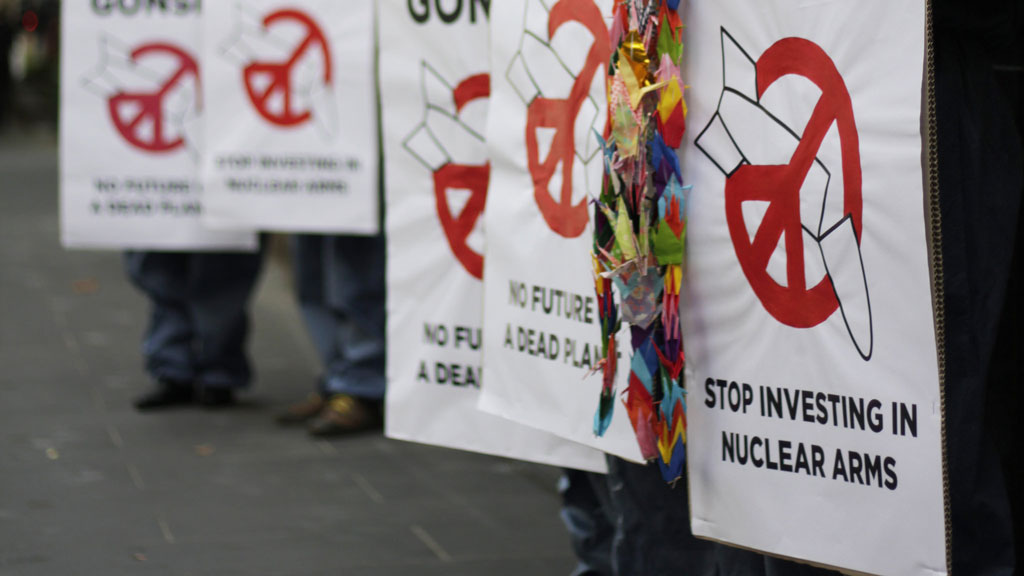
- Nuclear weapons are inhumane in the same way that biological weapons are – they indiscriminately kill not only enemy soldiers, but also innocent civilians. They are also unusable: it would be suicidal to use them against a nuclear nation and immoral to use them against a non-nuclear nation. Institutions can and do have their own opinion when it comes to what is allowable for them to invest in. They can decide they just won’t invest in products that are inhumane and that work against them and life on this planet.
- Divestment is an important and integral part of the movement against nuclear weapons because it helps further stigmatize and delegitimize nuclear weapons. Almost nobody wants to be known as a nuclear-weapons investor, just as financial institutions don’t want to be known for investing in prostitution or child labor. Stigma matters. Furthermore, if even a few institutions or states divest from a company using the same justification, they can impact a company’s strategic direction and involvement in immoral activities. Here are some examples:
- a) During the cold war, General Electric was participating in nuclear weapons production. After a campaign lead by Corporate Accountability International, GE “caved under enormous public and financial pressure and officially moved out of nuclear weapons business.”2 Similarly, Revlon decided to divest from South Africa when boycott threats by consumer groups became credible and persistent.3
- b) US company Lockheed Martin, the world’s largest arms manufacturer, announced it ceased its involvement with the production of rockets, missiles or other delivery systems for cluster munitions and stated it will not accept such orders in the future. The arms manufacturer expressed the hope that its decision to cease the activities in the area of cluster munitions would enable it to be included in investors portfolios again, thereby suggesting that pressure by financial institutions had something to do with its decision.4
- c) Textron announced it would stop the production of cluster munitions and commentators in financial media suggested that one reason for this decision would be to increase the ‘ownability’ of Textron shares as many European investors largely exclude cluster munitions producers from financing.5
- Divestment is also about cutting ties with the nuclear weapons industry. Nuclear weapons producing companies cultivate sponsorship relationships, creating a ‘social license to operate’. This contributes to the veneer of legitimacy that enables them to keep expanding operations. During much of the 20th century, tobacco companies were seen as respectable partners for public institutions. That is no longer the case. These sponsorship affiliations no longer exists because the mere thought of any cigarette branding or association elicits disgust in many people. This is the power of stigmatization: to change norms. Given how dangerous and inhumane nuclear weapons are, the companies that produce them should be seen in the same negative light.
Breaking the sponsorship link between nuclear weapons producing companies and institutions will not alone prevent disasters. But creating an informed public debate will increase questions about the acceptability of associating these companies with local governments and institutions. And increased public debate has been proven to lead to productive legislation, which generates new laws and policies that change behavior.6 - Consumers are more socially responsible. Around the world, consumers seek ways to fund and participate in socially responsible activities, whether by purchasing fair-trade products or shifting their investments towards socially responsible funds. Citizens wish to know that their municipality reflects their shared values and principles. Joining this wave of enthusiasm helps to show that your local city is engaged in the world, is not willing to accept to the status-quo, and is encouraging financial institutions to offer more socially responsible funds. As financial institutions make more options available, they make divesting easier for everyone, while promoting a socially conscious culture.4. Consumers are more socially responsible. Around the world, consumers seek ways to fund and participate in socially responsible activities, whether by purchasing fair-trade products or shifting their investments towards socially responsible funds. Citizens wish to know that their municipality reflects their shared values and principles. Joining this wave of enthusiasm helps to show that your local city is engaged in the world, is not willing to accept to the status-quo, and is encouraging financial institutions to offer more socially responsible funds. As financial institutions make more options available, they make divesting easier for everyone, while promoting a socially conscious culture.

- Nuclear weapons producers are financially neutral. Because of the efficiency of the market, the expected return on investment from nuclear weapons producers is not significantly higher or lower than for other industries and markets. There is no significant financial benefit – or loss – from divesting from these producers.5. Nuclear weapons producers are financially neutral. Because of the efficiency of the market, the expected return on investment from nuclear weapons producers is not significantly higher or lower than for other industries and markets. There is no significant financial benefit – or loss – from divesting from these producers.
- The Nuclear Non-proliferation Treaty is a binding obligation to negotiate disarmament and eliminate arsenals.7 This obligation means that nuclear weapons production is not a viable long-term industry.6. The Nuclear Non-proliferation Treaty is a binding obligation to negotiate disarmament and eliminate arsenals.7 This obligation means that nuclear weapons production is not a viable long-term industry.
- Governments can help set norms in multiple ways::7. Governments can help set norms in multiple ways::
- a) By raising societal moral standards.
- b) By raising public awareness.
- c) By promoting citizen involvement.
- d) By pressuring mutual fund firms to offer nuclear weapons free funds. This helps to make socially responsible investing a norm.
- Please join the cities of Cambridge, MA, Takoma Park, MD and the wave of other institutions that are divesting!8
How to Divest

- Use the Future of Life Institute’s (FLI) divestment application to check your holdings.9 Through our application, you can check for both direct and indirect holdings in nuclear weapons producing companies. You may also contact FLI directly if you have any questions regarding the exposure of certain mutual funds to nuclear weapons holdings. We are happy to provide a thorough pro-bono analysis of such holdings. There are currently 27 companies nuclear weapons producing companies that should be screened for.10
- Consult with your financial manager(s). This is a good opportunity to express your desire for your city’s investments to be meaningfully integrated with nuclear weapons divestment values. Some helpful questions might be:
- a) How will this affect financial performance?
- b) Have you ever filed a shareholder resolution on environmental or social issues or do you work with managers that do?
- c) How are the companies in my portfolio exposed to nuclear weapons production?
- d) What guidelines are you using to vote our proxies?
- Draft resolution and policy implementation:
- a) Explicitly prohibit investments in the 27 producers of nuclear weapons and/or key components for nuclear weapons and delivery systems.11 Your order or resolution should forbid investment in any companies that produce key components for “an explosive device which employs nuclear fission or nuclear fusion to generate explosive force.” You may also wish to divest from indirect holdings entirely or these same holdings above a certain exposure threshold. Now is the time for the degree to which you will divest to be explicitly stated. For your own resolution, you are welcome to copy any or all language from the nuclear divestment resolution that was passed by the city of Cambridge, MA,12 which received a commendation from the U.S. Conference of Mayors.13 Develop a comprehensive policy against investing in nuclear weapon productions and a timeline for shifting to nuclear free funds.
- b) If your city contracts external investment consultants to manage your pension funds and other holdings, then change the language in your request for proposals to reflect your new policy. Here is an example of draft language that is simple to integrate: “We require the ability to meet fiduciary standards and return benchmarks, while not including any direct or indirect investments in nuclear weapons producing companies. A list of these (currently 27) companies will be provided upon request.” In case you prefer a softer divestment policy, “or indirect” can be omitted; otherwise investment in financial institutions that support nuclear weapons production is prohibited.
- Promoting and supplementing divestment efforts: tell companies why you’re divesting, apply divestment policy to all activities.
- Follow up with your portfolio manager(s) at regular intervals to confirm that your investments reflect your intended goals and values.
Answers to Common Reservations Regarding Socially Responsible Investing (SRI)
1) “We are too small to use SRI strategies.”
Many SRI strategies are available through pooled structures or have low customizable separately managed account (SMA) minimums.
2) “We don’t have the resources to implement SRI.”
Investing with values doesn’t require much staff effort, but it does require an internal champion to make it happen. Developing SRI criteria for your Investment Policy Statement will take some time but the introspective and strategic conversations that result will be worth it. Experienced consultants will be able to help here enormously so that you don’t have to “reinvent the wheel.”
And you don’t need to do everything at once. For example, you can start by applying your values to cash management—making deposits in community finance development institutions (CDFIs) does not require specialized skills. As you gain experience and confidence, you can expand your remit.
3) “SRI underperforms.”
This unfortunately widely-held myth has—fortunately—no basis in fact. There have been reams and reams of academic studies as well as meta-analyses that show SRI does not negatively impact performance. Furthermore, nuclear weapons producing companies only make up about 2% of the S&P 500 and are thus likely to represent only a negligible fraction of your holdings. Visit www.ussif.org/performance to view the latest performance studies.
4) “There aren’t enough good SRI products out there.”
This may have been the case 10 or 20 years ago, but it is certainly no longer true. There is a large and expanding range of investment vehicles designed specifically to achieve both a social and financial return across all asset classes. It is time for your consultant or advisor to do some more research. It will take time and effort on their part, but this what you pay them for
5) “Divesting from nuclear weapons jeopardizes national security”
A Pentagon report suggested that about 300 nuclear weapons would give the U.S. an iron-clad deterrent, but the U.S. currently has about 7,000, so our nuclear arsenals could be dramatically slashed while retaining nuclear deterrence. Moreover, the U.S. is planning to invest a trillion dollars in replacing most of its nuclear weapons by new ones that are more useful for a first strike; this is what divestment would primarily target. Reducing nuclear arsenals has support from security experts across the political spectrum, including former U.S. Secretary of Defense William Perry who used to oversee our nuclear forces.
References
1) http://www.dontbankonthebomb.com/nuclear-weapon-producers/
2) https://www.stopcorporateabuse.org/success/boycott-helps-compel-ge-stop-manufacturing-nuclear-weapons
3) https://animalcharityevaluators.org/blog/divestment-an-opportunity-for-effective-animal-advocacy/
4) http://www.huffingtonpost.com/susi-snyder/nuclear-weapons-are-scary_b_9947542.html
5)https://www.un.org/disarmament/ptnw/pdf/A%20CONF.229%202017%20NGO%20WP.5%20Ban_financing_UNSubmission%20from%20PAX.pdf
6) http://www.smithschool.ox.ac.uk/research-programmes/stranded-assets/SAP-divestment-report-final.pdf#page=14
7) https://www.un.org/disarmament/wmd/nuclear/npt/
8) http://www.dontbankonthebomb.com/2016-hall-of-fame/ https://futureoflife.org/2016/06/29/u-s-conference-of-mayors-nuclear-divestment/
9) https://futureoflife.org/invest/
10) http://www.dontbankonthebomb.com/nuclear-weapon-producers/
11) http://www.dontbankonthebomb.com/nuclear-weapon-producers/
12) http://cambridgema.iqm2.com/Citizens/Detail_LegiFile.aspx?Frame=&MeetingID=1557&MediaPosition=&ID=2104&CssClass
13) http://wslfweb.org/docs/MfP-USCM-res2016.pdf
More Resources
http://www.dontbankonthebomb.com/
https://www.zevin.com/
https://futureoflife.org/
For help, support, or any questions, please reach out to Lucas@futureoflife.org.
About the Future of Life Institute
The Future of Life Institute (FLI) is a global non-profit with a team of 20+ full-time staff operating across the US and Europe. FLI has been working to steer the development of transformative technologies towards benefitting life and away from extreme large-scale risks since its founding in 2014. Find out more about our mission or explore our work.
Related content
Other posts about Nuclear
